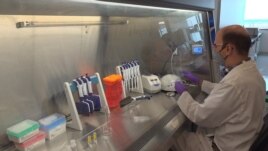12 November 2020
It takes years of research and testing to produce a vaccine. But scientists are hopeful that a technology called messenger RNA, or mRNA, could produce a safe and effective vaccine against COVID-19 by the end of the year.
The World Health Organization (WHO) says there are 11 COVID-19 vaccine candidates currently undergoing Phase 3 trials around the world. The trials involve large groups of volunteers. Some receive the experimental vaccine while others are given an inactive substance called a placebo.
Among the most promising vaccine candidates are two that use mRNA technology. Those experimental vaccines come from American drug-makers Moderna and Pfizer. Pfizer is partnered with German company BioNTech on the project.

A technician inspects vials of coronavirus disease (COVID-19) vaccine candidate BNT162b2 at a Pfizer manufacturing site in manufacturing site in St. Louis, Missouri, U.S. in an undated photograph. (Pfizer/Handout via REUTERS)
On Monday, Nov. 9, Pfizer and BioNTech announced that their mRNA-based experimental vaccine appears to be more than 90 percent effective in preventing COVID-19.
The partnership said the early finding involved 94 volunteers in the trial who developed COVID-19. About 44,000 volunteers took part in the late Phase 3 study. An independent group of scientists called the Data Safety Monitoring Board examined the study.
Pfizer and BioNTech also said they have found no serious safety concerns in the testing so far. They expect to seek emergency use permission from the U.S. Food and Drug Administration (FDA) later this month. The agency requires a vaccine be at least 50 percent effective for emergency use.
Dr. Anthony Fauci is the U.S. government's top infectious diseases expert. He called the safety result of Pfizer and BioNTech's study "extraordinary."
"Not very many people expected it would be as high as that," he said.
Dr. Bruce Aylward is a top adviser at the WHO. He said Pfizer's vaccine could "fundamentally change the direction of this crisis."
Two days later, Massachusetts-based Moderna announced that it is preparing to send its Phase 3 study to the Data Safety Monitoring Board. Moderna said it has more than 53 cases of COVID-19 infections out of 30,000 volunteers.
Fauci told the Financial Times that he expected good results from Moderna's study because the two mRNA-based vaccines are "identical in many respects."
What is mRNA?
The U.S. Centers for Disease Control and Prevention says vaccines usually contain an inactive or weakened virus. Vaccines introduce a virus to the body to force the production of antibodies that fight the virus.
Both Pfizer and Moderna's vaccines are made with mRNA technology. They do not contain the coronavirus itself. To make an mRNA vaccine, scientists create a genetic material that directs the human body to produce antibodies that can recognize and destroy the coronavirus.
No mRNA product has been approved to treat people. Research in the technology started nearly 30 years ago.
In 1990, University of Pennsylvania scientist Katalin Karikó proposed using mRNA technology in gene therapy. At the time, the technology was difficult to work with. When she injected lab mice with the genetic material, some died.
Karikó worked with colleague Drew Weissman. They made a critical discovery in 2005. They replaced one of mRNA's four chemical building blocks with a slightly modified compound called pseudouridine. Weissman said, "We submitted that for a patent, and that was the birth of therapeutic RNA."
Karikó now works for BioNTech supervising development of its mRNA product.
Karikó and Weissman's findings, however, did not receive much attention until 2010. That year, Harvard University scientist Derrick Rossi used modified mRNA in his stem cell research. Rossi, along with several others, licensed the technology to establish a new biotech drug-maker called Moderna. The name is a combination of the words modified and RNA.
Rossi is no longer with Moderna but he credited Karikó and Weissman with the mRNA discovery. He told the medical website Stat that the two researchers deserve the Nobel Prize in chemistry.
"If anyone asks me whom to vote for some day down the line, I would put them front and center," he said. "That fundamental discovery is going to go into medicines that help the world."
I'm Caty Weaver.
Hai Do wrote this story for Learning English. Caty Weaver was the editor.
________________________________________________________________
Words in This Story
fundamentally - adv. at the most basic level
submit - v. to give a document so that it can be considered or approved
patent - n. an official document that gives the right of something to a person or company
therapeutic - adj. of or relating to the treatment of illness